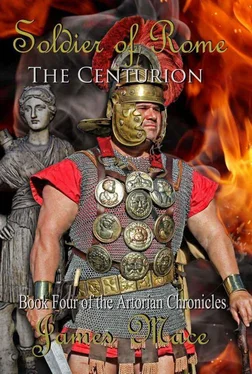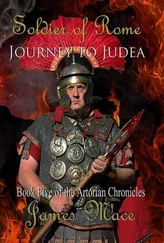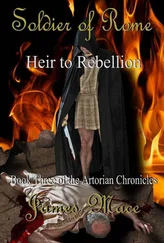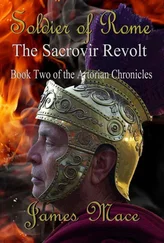James Mace - Soldier of Rome - The Centurion
Здесь есть возможность читать онлайн «James Mace - Soldier of Rome - The Centurion» весь текст электронной книги совершенно бесплатно (целиком полную версию без сокращений). В некоторых случаях можно слушать аудио, скачать через торрент в формате fb2 и присутствует краткое содержание. Жанр: Исторические приключения, на английском языке. Описание произведения, (предисловие) а так же отзывы посетителей доступны на портале библиотеки ЛибКат.
- Название:Soldier of Rome: The Centurion
- Автор:
- Жанр:
- Год:неизвестен
- ISBN:нет данных
- Рейтинг книги:3 / 5. Голосов: 1
-
Избранное:Добавить в избранное
- Отзывы:
-
Ваша оценка:
- 60
- 1
- 2
- 3
- 4
- 5
Soldier of Rome: The Centurion: краткое содержание, описание и аннотация
Предлагаем к чтению аннотацию, описание, краткое содержание или предисловие (зависит от того, что написал сам автор книги «Soldier of Rome: The Centurion»). Если вы не нашли необходимую информацию о книге — напишите в комментариях, мы постараемся отыскать её.
Soldier of Rome: The Centurion — читать онлайн бесплатно полную книгу (весь текст) целиком
Ниже представлен текст книги, разбитый по страницам. Система сохранения места последней прочитанной страницы, позволяет с удобством читать онлайн бесплатно книгу «Soldier of Rome: The Centurion», без необходимости каждый раз заново искать на чём Вы остановились. Поставьте закладку, и сможете в любой момент перейти на страницу, на которой закончили чтение.
Интервал:
Закладка:
His ship was slated to return to Rome to pick up cargo bound for North Africa, more slaves no doubt. The last time they docked it had been dark, and they were there to transport the single prisoner and some Praetorian Guardsmen. These men had elected to stay at Capri for a while, looking for some leisure and entertainment. Life on the ship was dull for the most part. They remained just far enough out to sea that all he could see was the water and skyline through the small portal next to his oar. Still, it did pay a decent wage; one hundred denarii per annum, plus bonuses on specialty cargo. Each man had been given an extra three denarii just for transporting this prisoner that the Emperor was anxious to have brought to him.
The ship’s captain promised them some time off in Rome, and Alaric hoped to take advantage of this. The last leave they had gotten was in Mauretania, at a bleak and desolate port that he would just as soon forget. Their cargo for that voyage was prisoners and condemned criminals bound for the sulfur mines. There hadn’t even been any decent brothels to steal away his virtue. He then wondered if he was betraying his slain kinsmen by wishing to seek out physical comforts with Roman women. After all, Rome had to have the best houses of lust in the whole of the Empire, and what better place for him to finally become a man? Still, it troubled him. He knew that he should hate the Romans, but he just could not envision the few that he had seen with the people that had murdered his tribe. He was a confused lad and not sure what he was hoping to find by venturing into the Eternal City. Part of him was fascinated by the heart of the Empire; a place which ruled the civilized world from the far reaches of Hispania to Arabia. The seemingly chaotic city lorded over all.
The other part of his soul cried out for revenge. This tore at him, for he knew he must be honor bound to avenge his murdered father and fellow tribesmen. It was difficult for him to harness this desire, since he had little to no memories of any of them or of their deaths. He vaguely remembered running to his father, who picked him up and held him close. Barholden must have known that his death approached, for he had shown his son much affection, and Alaric swore he could remember a trace of sadness, though he still struggled to envision his father’s face. That was the last time he could remember seeing him. Barholden, chief of the Marsi, was killed the following day, along with most of the warriors who fought in vain to protect their families from the wrath of the legions. Alaric had never even seen a legionary before that fateful day.
Milla had been one of the best swimmers in their village, and with him across her back she had managed to cross the raging river before the Romans arrived. She had practically smothered him while she watched the legions burn the village and kill everyone within. Alaric wasn’t certain if he could remember the sounds of people screaming. Milla had shielded his eyes and ears, plus the noise of the river would have drowned out most other sounds. She later told him how she watched his grandfather, aunt, and newborn cousin all murderously butchered by the soldiers. He had no memory of any of them, and therefore struggled to put any emotional weight behind her words.
“You alright?” the words of the man who shared the same oar bench startled him. The two had become friends over the last three years, though Alaric had never told him about his past or where he was originally from.
“Fine,” he lied. “Just thinking, that’s all.”
“Yeah, well there’s not much else to do on a cargo ship, now is there?” the young man mused as they both put their backs into rowing away from the isle.
Alaric had grown strong and well conditioned during his time at sea, and the task of rowing was little more than a routine for him now. Though the captain had promised them leave in Rome, his instincts told him otherwise. If they were transporting more slaves to North Africa, he figured that would be where they would be given some leisure time. Rumor also had it that they might be headed towards the Far East; Egypt or Judea perhaps. Suddenly he didn’t even care. Though not a slave, he felt trapped on the ship. It was the only sure way of holding a steady wage that he knew of; he was fed and had a place to sleep at night. He could not leave until he knew for certain what it was he was looking for. He was starting to panic that whatever it was, he would not find it sitting in the hot and sweat infested hull of a Roman cargo ship.
It had been months since the ‘slaying of the Roman army,’ as people now called it. The people called for celebrations, for they had succeeded in expelling the Romans from their lands. The hated scourge brought on by that bastard Olennius was now over. Frisia was free once more! To the warriors who fought at Braduhenna, they knew better. The reality was that they had lost the Battle of Braduhenna, along with their beloved King, the Royal Prince, and thousands of warriors. The sound diplomacy of their new King, Tabbo, had brought freedom to Frisia, not the swords and axes of their fighters.
Still, with the time for mourning of the dead over, one particular warrior felt the time was now appropriate to conduct one last honor and to fulfill a promise made. He still needed his rudimentary crutches in order to walk great distances, and it was several miles to the sacred grove. He left in early afternoon, his young son helping him heft a sack onto his shoulder.
“Are you sure you don’t want me to come with you?” the boy asked, wishing to help his father, whom he watched struggle as he tried to walk and carry the sack.
“This is something I have to do alone, lad,” the warrior said. “Besides, it would not do if your mother came home to find us both missing.”
His wife had been out in the woods harvesting berries all afternoon and would not be back until dark. He told his son to let her know that there was something he had to do, and that he may not be back until late, possibly the next morning.
As painful as it was, it still felt good, in a way, to stretch his stiffened legs out as he walked along the dirt road. Most of the farmers were out harvesting their crops, at least those who were still able. Many in the community worked to assist those families who had lost their fathers and sons or whose men had come back too injured to work. It was a great strain on all, yet there was still a sense of relief in the air. Cattle hides were no longer set aside to be sent to Rome as tribute, and all the grain and hay grown would feed their livestock and themselves, not some fat, foreign aristocrat. The people would survive and thrive.
By late afternoon he arrived at the sacred grove dedicated to the goddess Freyja. It was the same place where his people had taken all of their dead and wounded after Braduhenna. He found it fitting that this was where the dead had been taken after the battle, since it was Freyja who took the fallen heroes to her great house, known as Sessrúmnir. Great stone alters were spaced throughout the edges of the grove. All of them were blackened with ash from thousands of vigils dedicated to Frisia’s fallen. Blue irises, which were common in the land, grew throughout and contrasted with the scorched rock.
The warrior set down his sack and sat on a wooden bench located near one of the altars. His legs were cramping badly, and he knew it had been foolish to make such a long trek on foot alone. Still, he did not care, determined as he was to fulfill what he felt was a final honor to a fallen hero. There was still time before dark, and he pulled a slab of spitted meat wrapped in cloth, along with a small loaf of freshly baked bread from his sack. As he ate his supper in silence a gentle breeze blew through the glade. The smell of old burnt offerings mixed with the sweet scent of flowers. The sun cast its glow on the horizon, and he felt a chill as a stronger gust of wind blew through the trees.
Читать дальшеИнтервал:
Закладка:
Похожие книги на «Soldier of Rome: The Centurion»
Представляем Вашему вниманию похожие книги на «Soldier of Rome: The Centurion» списком для выбора. Мы отобрали схожую по названию и смыслу литературу в надежде предоставить читателям больше вариантов отыскать новые, интересные, ещё непрочитанные произведения.
Обсуждение, отзывы о книге «Soldier of Rome: The Centurion» и просто собственные мнения читателей. Оставьте ваши комментарии, напишите, что Вы думаете о произведении, его смысле или главных героях. Укажите что конкретно понравилось, а что нет, и почему Вы так считаете.












